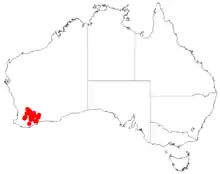| Acacia brachyphylla | |
|---|---|
| Scientific classification | |
| Kingdom: | Plantae |
| Clade: | Tracheophytes |
| Clade: | Angiosperms |
| Clade: | Eudicots |
| Clade: | Rosids |
| Order: | Fabales |
| Family: | Fabaceae |
| Subfamily: | Caesalpinioideae |
| Clade: | Mimosoid clade |
| Genus: | Acacia |
| Species: | A. brachyphylla |
| Binomial name | |
| Acacia brachyphylla | |
 | |
| Occurrence data from AVH | |
Acacia brachyphylla is a shrub of the genus Acacia and the subgenus Plurinerves that is endemic to a small area in south western Australia.
Description
The spreading upright shrub typically grows to a height of 0.2 to 0.3 metres (0.7 to 1.0 ft).[1] It has densely hairy and terete branchlets that have persistent Stipules narrowly triangular stipules that are about 1.5 mm (0.059 in) in length. Like most species of Acacia it has phyllodes rather than true leaves. The evergreen, ascending to erect phyllodes are straight to curved with a length of 3 to 12 mm (0.12 to 0.47 in) and a width of around 1 mm (0.039 in) with six to eight minutely villous nerves.[2] It blooms from August to October and produces yellow flowers.[1] The simple inflorescences occur singly or in pairs and have spherical flower-heads with a diameter of 3 to 4 mm (0.12 to 0.16 in) containing 8 to 12 golden coloured flowers. Following flowering thinly coriaceous to firmly chartaceous seed pods have a linear shape. The pods have a length of up to 5 cm (2.0 in) and a width of 1.5 to 4.5 mm (0.059 to 0.177 in) and can be hairy or glabrous or covered in a fine white powder. The mottled brown to grey-brown seeds have a broadly ovate shape and a length of 2 to 2.5 mm (0.079 to 0.098 in).[2]
Taxonomy
There are two recognised varieties:
- Acacia brachyphylla var. brachyphylla
- Acacia brachyphylla var. recurvata
Distribution
It is native to an area in the Wheatbelt and Great Southern regions of Western Australia where it is commonly situated on sandplains growing in gravelly and sandy loam soils.[1] The range of the plant extends from around Tammin in the north west to around Jerramungup in the south east.[2]
See also
References
- 1 2 3 "Acacia brachyphylla". FloraBase. Western Australian Government Department of Biodiversity, Conservation and Attractions.
- 1 2 3 "Acacia brachyphylla". World Wide Wattle. Western Australian Herbarium. Retrieved 11 October 2020.